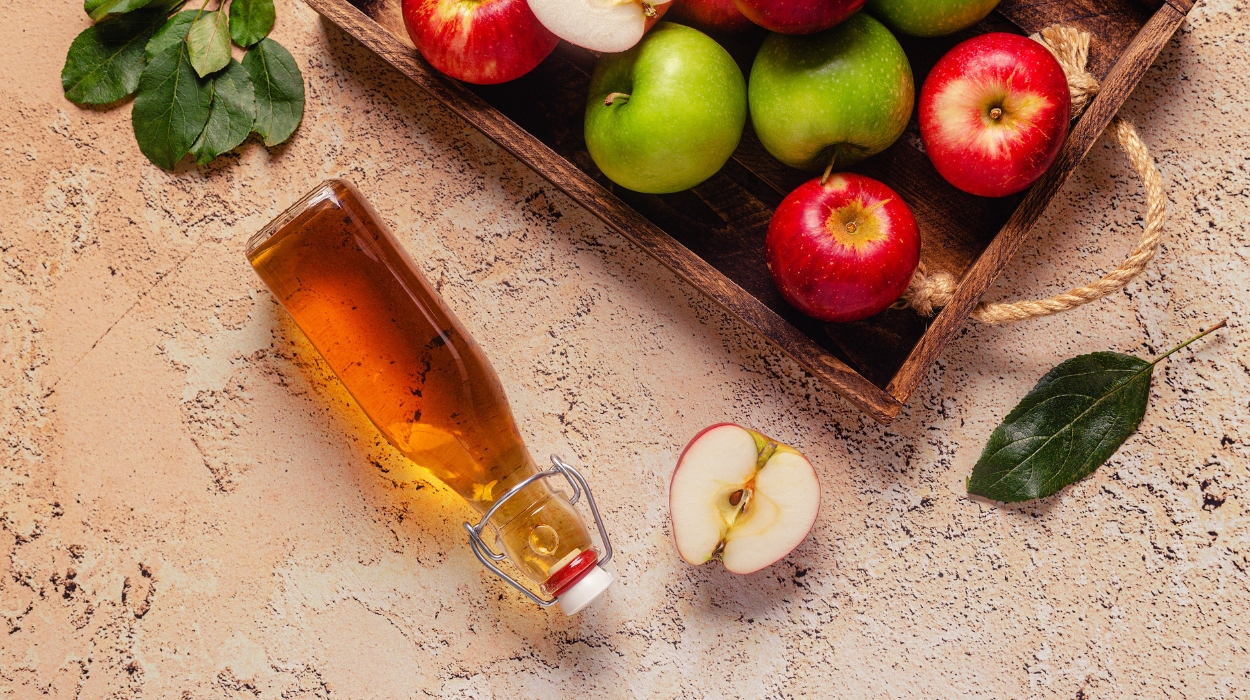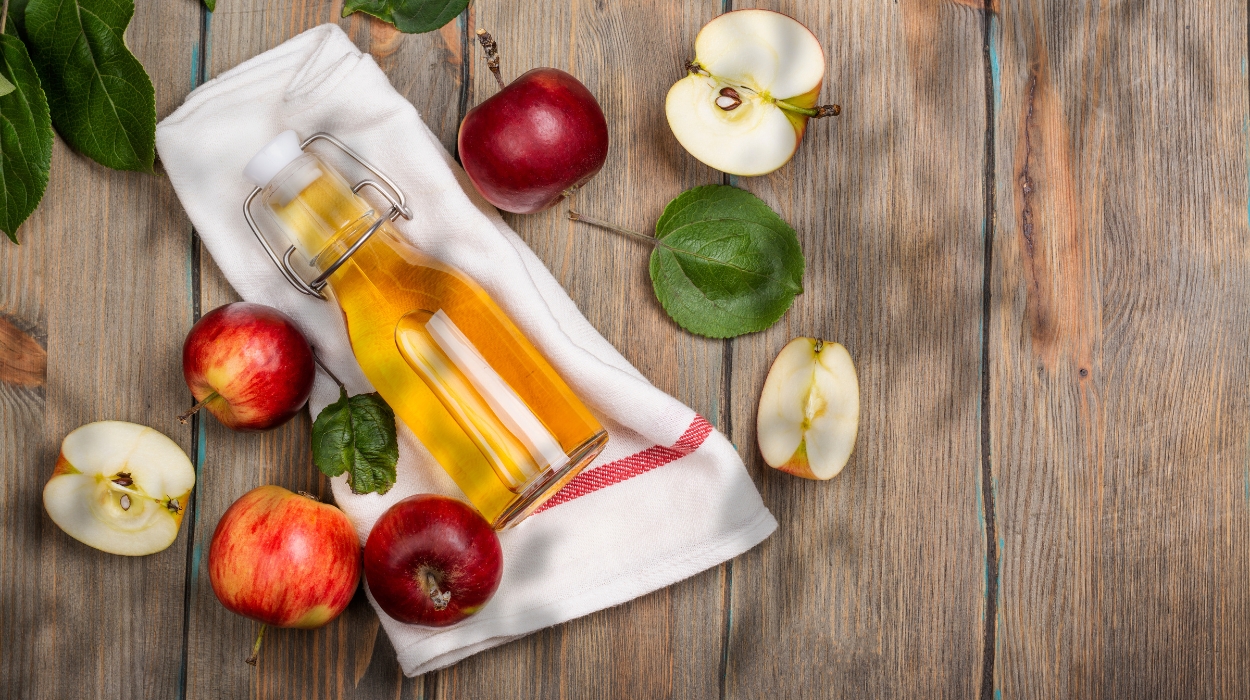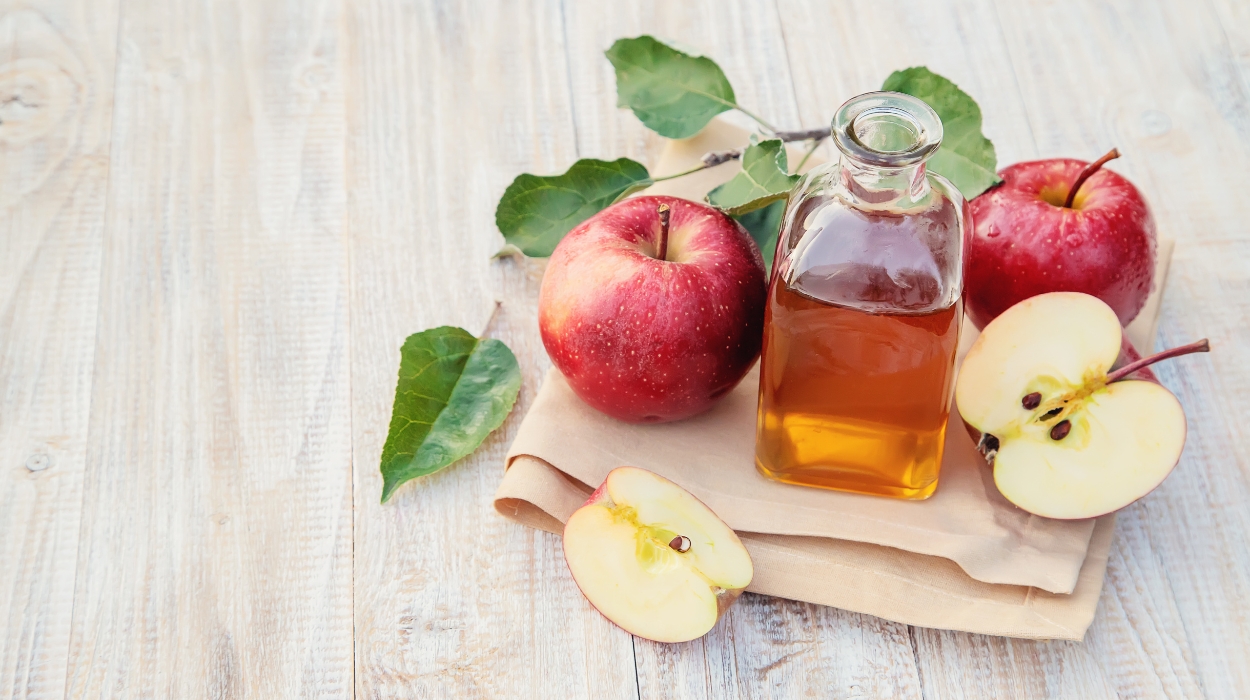 Expert's opinion
Expert's opinion
Expert's opinion
The article is a subjective view on this topic written by writers specializing in medical writing.
It may reflect on a personal journey surrounding struggles with an illness or medical condition, involve product comparisons, diet considerations, or other health-related opinions.
Although the view is entirely that of the writer, it is based on academic experiences and scientific research they have conducted; it is fact-checked by a team of degreed medical experts, and validated by sources attached to the article.
The numbers in parenthesis (1,2,3) will take you to clickable links to related scientific papers.
5 Possible Apple Cider Vinegar Side Effects You Need To Know 2024

Apple cider vinegar is credited with a wealth of different health benefits: lose body fat mass, lower your cholesterol levels, heal your gut, and more, all by drinking vinegar.
Many of these claims appear to have plenty of merits, but the food science community at large admits that there’s still plenty that we don’t know about this fermented juice byproduct. Does apple cider vinegar make you poop? Is it safe to drink apple cider vinegar on an empty stomach? With so much buzz about it, can we ever know the truth?
If taken improperly, you might find yourself with a sore throat, muscle cramps, and a lower digestive tract all out of whack. So, no discussion is complete without the five apple cider vinegar side effects you should be aware of (who would have ever thought that something as simple as a bunch of fermented crushed apples would be able to cause so much drama?).
What Are The Side Effects Of Apple Cider Vinegar?
- Might interact with your medication
- Highly acidic and may cause chemical irritation or burns
- Might damage tooth enamel
- Can lower your blood sugar significantly
- Might even cause low potassium
Possible Apple Cider Vinegar Side Effects
Apple cider vinegar is loved deeply for its associated roles in weight loss, blood glucose control, and a number of beauty-related applications, such as an apple cider vinegar hair rinse. All of these uses for apple cider vinegar may seem innocent and wholesome enough, but when carried out improperly or irresponsibly, it may leave you with a bad taste in your mouth (figuratively, and in your stomach, too, literally).
Could a tablespoon mix into your morning tea really cause such a problem? Let’s take a closer look at some of the adverse side effects of apple cider vinegar (ACV), how you can stay safe while using it, and who should avoid apple cider vinegar entirely.
Apple Cider Vinegar Might Interact With Your Medication
Those with diabetes, hypertension, and other metabolic issues of the endocrine system are not great candidates for apple cider vinegar supplementation. Minor health benefits aside, apple cider vinegar intake might have the potential to seriously mess with your routine of prescription medicine and some over-the-counter remedies. Just because ACV is “natural” doesn’t prevent it from reacting chemically with medicine in your body.
Delayed gastric emptying[1] caused by the effects apple cider vinegar renders within the body, for example, may prove to be especially problematic for those living with type I diabetes, since diabetes also does this, and the effects may be additive. This makes the timing of one’s glycemic control routine even more difficult to forecast and manage actively; for this reason, we cannot recommend ACV to any person with diabetes mellitus, especially undiluted apple cider vinegar.
Apple Cider Vinegar Is Highly Acidic And May Cause Chemical Burns

Topical apple cider vinegar may irritate, burn, or otherwise cause discomfort to the skin and body; while not an allergic reaction, per se, even the surface of the skin may become inflamed and damaged[2] when exposed at length to any vinegar varieties, including apple cider vinegar.
The most obvious piece of advice here is twofold:
- Always dilute your apple cider vinegar when you use it, just like you would when adding it to salad dressings.
- Avoid applying apple cider vinegar to any part of your body at length, including your skin, hair, gums, and nails (those touting the benefits of ACV hair rinse for hair health use a very dilute preparation).
In a general sense, when taking apple cider vinegar in moderation, you should use approximately one or two tablespoons per cup of water. This gentler drink offers several health benefits; for example, drinking apple cider vinegar in this way may be able to suppress your appetite, leading you to consume fewer calories throughout the day, as well as controlling blood sugar.
As with all fruit juices and acidic foods, those with acid reflux might be well-advised[3] to avoid apple cider vinegar’s effects in this area, especially undiluted vinegar, even if they would like to lose weight. Consuming vinegar might upset an already inflamed stomach even further since delayed stomach emptying plays a role in acid reflux.
Apple Cider Vinegar Might Cause Dental Erosion
One popular at-home remedy: add apple cider vinegar to a nightly mouthwash, and, like magic, one is said to wake up with fresher breath and a cleaner mouth devoid of the overnight biofilm that we’re all very familiar with. While there is evidence indicating that this may be true,[4] doing so might put your teeth, digestive tract, and enamel at risk, even if you dilute your ACV concoction with lots of water.
According to Pronamel, any substance with a pH of 5.5 or lower is acidic enough to erode the enamel on your teeth. Apple cider vinegar with a chemical composition of at least 5 percent acetic acid boasts a pH value of anywhere from 2.8 to 3,[1] putting it well within the danger zone as far as oral health goes. Tooth decay, gum and bone loss, throat irritation, and difficulty swallowing may all ensue.
Pronamel mentions that one can always balance out the harsh, acidic nature of many acidic foods and drinks by ingesting them alongside alkaline, basic accompaniments to neutralize them. This may work when consuming apple cider vinegar, but, in the case of a nightly mouth rinse, it may prove to be tricky if going to bed with a clean mouth is your aim.
Our advice? Try things like tongue scrapers, oil pulling, store-bought mouthwashes, good oral hygiene, and a healthy diet full of fibrous foods like raw apples. Also, know that the best way to minimize mouth odor (halitosis) is just good dental hygiene of your teeth and gums, which includes not smoking and avoiding mouth-breathing.[5]
For those who love the positive effects of apple cider vinegar but would like to avoid tooth decay, one may consider using apple cider vinegar tablets or apple cider vinegar gummies in its stead. These alternatives offer many of the apple cider vinegar’s benefits, all without the high acid content and other potentially negative effects.
Apple Cider Vinegar Can Lower Your Blood Sugar Significantly

While apple cider vinegar’s impact on blood sugar is one of the most popular topics of contention[6] surrounding this potential alternative therapy for diabetes and other blood glucose-related conditions, its role in diabetes control is still not yet fully understood.
What appears to be true in a general sense[7] is that an apple cider vinegar intervention might, in fact, tend to lower one’s blood sugar. In some cases, this might be awesome. However, this tendency might put those with certain health conditions at risk at other times.
Hypoglycemia is a condition that can impact anybody, but, most pertinently, those with type I diabetes.[8] Although diabetes is a disease of high blood sugar, it can involve extreme swings from high (hyper-) to low (hypo-) when a manipulated diet or insulin is involved. Clinically, one is said to be hypoglycemic when their plasma glucose concentrations fall below 70 mg/dL, although the patient may not be aware of the problem until their blood glucose levels have already hit 55 mg/dL or lower.
Because of this, the danger that apple cider vinegar poses to an otherwise healthy lifestyle one is able to have, even with diabetes, certainly should be taken seriously. Those with high blood sugar levels in the present moment may be able to[9] lower blood sugar levels by taking apple cider vinegar. However, if you’re already feeling low due to hypoglycemia, too much vinegar at once may worsen symptoms enormously.
In either case, you should never use apple cider vinegar in lieu of diabetes medications or any other blood sugar control that your doctor has prescribed to you.
(On the flip side, ACV lowers your bad cholesterol (LDL) and triglycerides and raises the good cholesterol.[10] Bonus!)
Apple Cider Vinegar Might Even Cause Low Potassium
This one is kind of an oddball, but it’s no joke. When you consume vinegar in excess, you might put yourself at risk for hypokalemia,[11] which is a term that refers to dangerously low potassium levels in the body. Having the right potassium is crucial for your heart function, rate, and rhythm.
While the underlying metabolic mechanism at play responsible for this apple cider vinegar side effect is not yet fully understood, some studies suggest that the acetic acid that ACV contains might be to blame. When the body metabolizes the acetic acid in cider vinegar, it excretes potassium,[12] leaving you in a deficit.
The symptoms of hypokalemia may include nausea, vomiting, and abdominal distension, with muscle cramps, rhabdomyolysis, and myoglobinuria to follow if left unaddressed and unreplenished.[13] It can even cause heart failure and death, but usually, you’ll be warned about the milder effects in plenty of time to take corrective action. While these case studies examined individuals consuming upwards of 250 mL of apple cider vinegar daily, even moderate apple cider vinegar use may confer some of these ACV side effects. As always, proceed with caution, and consult your doctor when in doubt.
Final Thought
Even the healthiest foods and food supplements on the block shouldn’t be consumed in inordinate quantities, especially all at once. Your weight loss journey is not worth the health of your tooth enamel. If you fall into any of the categories above, the apple cider vinegar diet may not be ideal for you.
+ 13 sources
Health Canal avoids using tertiary references. We have strict sourcing guidelines and rely on peer-reviewed studies, academic researches from medical associations and institutions. To ensure the accuracy of articles in Health Canal, you can read more about the editorial process here
- Hlebowicz, J., Darwiche, G., Björgell, O. and Lars-Olof Almér (2007). Effect of apple cider vinegar on delayed gastric emptying in patients with type 1 diabetes mellitus: a pilot study. BMC Gastroenterology, [online] 7(1). doi:https://doi.org/10.1186/1471-230x-7-46.
- Feldstein, S., Afshar, M. and Krakowski, A.C. (2015). Chemical Burn from Vinegar Following an Internet-based Protocol for Self-removal of Nevi. The Journal of clinical and aesthetic dermatology, [online] 8(6), p.50. Available at: https://www.ncbi.nlm.nih.gov/pmc/articles/PMC4479370/.
- Jarosz, M. and Taraszewska, A. (2014). Risk factors for gastroesophageal reflux disease – the role of diet. Przeglad Gastroenterologiczny, [online] 5, pp.297–301. doi:https://doi.org/10.5114/pg.2014.46166.
- Liu, Y. and Hannig, M. (2020). Vinegar inhibits the formation of oral biofilm in situ. BMC Oral Health, [online] 20(1). doi:https://doi.org/10.1186/s12903-020-01153-z.
- Attia, E.L. and Marshall, K.G. (1982). Halitosis. Canadian Medical Association journal, [online] 126(11), pp.1281–5. Available at: https://www.ncbi.nlm.nih.gov/pmc/articles/PMC1863329/.
- Fahad Javaid Siddiqui, Pryseley Nkouibert Assam, Nisa, N., Sultana, R., Dalan, R. and Edwin Shih-Yen Chan (2018). Diabetes Control: Is Vinegar a Promising Candidate to Help Achieve Targets? Journal of Evidence-Based Integrative Medicine, [online] 23, p.215658721775300-215658721775300. doi:https://doi.org/10.1177/2156587217753004.
- Alireza Gheflati, Reihane Bashiri, Akram Ghadiri-Anari, Javad Zavar Reza, Marjan Tajik Kord and Azadeh Nadjarzadeh (2019). The effect of apple vinegar consumption on glycemic indices, blood pressure, oxidative stress, and homocysteine in patients with type 2 diabetes and dyslipidemia: A randomized controlled clinical trial. Clinical Nutrition ESPEN, [online] 33, pp.132–138. doi:https://doi.org/10.1016/j.clnesp.2019.06.006.
- Mathew, P. and Deepu Thoppil (2022). Hypoglycemia. [online] Nih.gov. Available at: https://www.ncbi.nlm.nih.gov/books/NBK534841/.
- Driss Ousaaid, Laaroussi, H., Meryem Bakour, Asmae ElGhouizi, Abderrazak Aboulghazi, Badiaa Lyoussi and Ilham ElArabi (2020). Beneficial Effects of Apple Vinegar on Hyperglycemia and Hyperlipidemia in Hypercaloric-Fed Rats. Journal of diabetes research, [online] 2020, pp.1–7. doi:https://doi.org/10.1155/2020/9284987.
- Beheshti, Z., Yiong Huak Chan, Hamid Sharif-Nia and Yiong Huak (2012). Influence of apple cider vinegar on blood lipids. [online] ResearchGate. Available at: https://www.researchgate.net/publication/260311324_Influence_of_apple_cider_vinegar_on_blood_lipids.
- Lhotta, K., Günther Höfle, Gasser, R. and Gerd Finkenstedt (1998). Hypokalemia, Hyperreninemia and Osteoporosis in a Patient Ingesting Large Amounts of Cider Vinegar. Nephron, [online] 80(2), pp.242–243. doi:https://doi.org/10.1159/000045180.
- Johnston, C.S. and Gaas, C.A. (2006). Vinegar: medicinal uses and antiglycemic effect. MedGenMed : Medscape general medicine, [online] 8(2), p.61. Available at: https://www.ncbi.nlm.nih.gov/pmc/articles/PMC1785201/.
- Castro, D. and Sharma, S. (2023). Hypokalemia. [online] Nih.gov. Available at: https://www.ncbi.nlm.nih.gov/books/NBK482465/.



